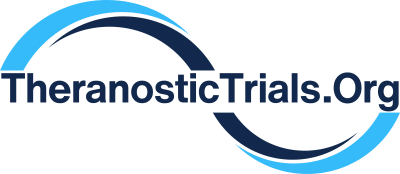Filters
(15 results)
Study Types
Enrolling Status
Study Sponsor Type
Gastric/Stomach (GI)
Study Status
Last Updated: Tue Aug 05 2025
Pharmaceutical Trials (Site Sponsors)
🇺🇸

Imaging Diagnostic
This is a multicenter, open-label, prospective Phase 1/2a study to assess safety and tolerability, establish dosimetry and to identify an optimal imaging dose (radioactivity and mass dose) and imaging time window of 64Cu-LNTH-1363S (64Cu Radiolabeled FAPi PET/CT Imaging Agent) and to compare its imaging biodistribution with FAP expression by immunohistochemistry (IHC) in patients with sarcomas or GIT cancers.
🇺🇸
🇬🇧

Treatment Locally Advanced Cancer
In this study, we want to learn how safe and effective the study drug, BAY2701439, is in patients with advanced cancer that has the protein HER2 (Human Epidermal growth factor Receptor 2) and cannot be cured by currently available treatment options.
🇺🇸

Treatment Metastatic Cancer
The purpose of this program is to provide access to [Lu-177]-PNT2002 to patients who have been diagnosed with prostate-specific membrane antigen (PMSA)-positive castration-resistant prostate cancer (mCRPC). Patients must have received at least 1 prior androgen pathway inhibitor (ARPI) and cannot be treated by currently available drugs or clinical trials.
Investigator Trials
Pharmaceutical & Investigator Trials (Non-Site Sponsors)
NCT05172310
PET Imaging of Tumors in Pancreas, Bile Ducts, Stomach and Ovaries by a Novel Tracer, 68Ga-FAPI-46 = Fibroblast Activation Protein Inhibitor
Cancers of the pancreas, bile ducts, stomach and ovaries are dismal diseases with most patients being diagnosed in advanced stages leading to a bad prognosis. These cancers can be difficult to diagnose and sometimes impossible to differentiate from underlying benign conditions. Establishing the correct diagnosis of primary cancer lesions and possible spread to other organs in time is pivotal for choosing the right therapy. Routinely applied staging procedures are however not always reliable. The main aim in this study is to evaluate the diagnostic accuracy of PET/CT with a novel radiotracer, FAPI, in the primary diagnosis of cancers in the pancreas, stomach and bile ducts as well as in patients with primary and recurrent epithelial ovarian cancer (EOC).
NCT05535621
68Ga-HER2 Affibody PET/CT Imaging for HER2-Positive Cancer Patients
The prevalence of HER2 alterations in pan-cancer indicates a broader range of application of HER2-targeted therapies. immunohistochemistry (IHC) or amplification by fluorescence in situ hybridization (FISH) is currently the most commonly used method for evaluation of HER-2 status in cancer patients. However, biopsies are spatiotemporally limited because of the highly heterogeneous expression of HER2. Patients with false-negative HER2 results may miss the chance for targeted therapy. Additionally, the HER2 status can change during the disease process. A investigational imaging tracer named 68Ga-HER2 Affibody binds to HER-2 receptors. Previous studies in human have shown the efficacy of 68Ga-HER2 Affibody in detecting HER2 positive breast cancer and gastric cancer without any observed toxicity. However, studies are still insufficient and limited to breast cancer and gastric cancer. The investigators hypothesized that 68Ga-HER2 Affibody PET imaging can noninvasively assess HER2 status in metastatic or recurrent solid tumors including breast cancer, gastrointestinal tumors, head and neck squamous tumors, bladder cancer, lung cancer and uterine tumors lesion. In this study, efficacy of 68Ga-HER2 Affibody in detecting HER2 positive cancer lesions and change of patient management based on 68Ga-HER2 Affibody PET will be determined.
NCT05619016
Phase II Study of [68Ga]Ga-ABY-025 PET for Non-invasive Quantification of HER2-status in Solid Tumors
The goal of this phase II clinical trial is to improve the selection of patients with solid tumors who would benefit from effective treatment with HER2 targeted drugs. This will be achieved by examining patients with HER2 positive tumors in the esophagus or stomach or patients with advanced breast cancer with low HER2 expression (HER2low) with the HER2 specific positron emission tomography (PET) tracer ABY-025 (HER2-PET) and compare the imaging results with HER2 expression in tumor tissue derived from biopsies (reference standard).
🇸🇪
NCT06147362
68Ga-NOTA-PEG2-RM26 PET/CT: Tracer Biodistribution and Uptake in Different Kinds of Cancer With Gastrin-Releasing Peptide Receptor (GRPR) Overexpression
The gastrin-releasing peptide receptor (GRPR), also known as bombesin receptor subtype II (BB2), is a member of the G protein-coupled receptor family of bombesin receptors. GRPR is over-expressed in various types of human tumors. RM26, a GRPR antagonist with high affinity, was discovered by peptide backbone modification of bombesin analogues. To target gastrin-releasing peptide receptor in human neoplastic cells NOTA-PEG2-RM26 was synthesised and then labeled with 68Ga. An open-label whole-body PET/ CT study was designed to investigate the safety and dosimetry of 68Ga-NOTA-PEG2-RM26 and to assess its clinical diagnostic value in patients with cancer.
🇺🇸
NCT06503146
18F-Fibroblast Activation Protein Inhibitor ([18F]FAPI-74) PET Imaging for Cancer Detection
Fibroblast-activation protein (FAP) is an enzyme that appears in high numbers in certain cancer cells. [18F]FAPI-74 is a new tracer-a substance that is injected into a person s body before an imaging scan. Researchers believe that [18F]FAPI-74 may be able to highlight FAP enzymes more effectively than approved tracers. If so, the new tracer would make it easier to find FAP-positive tumors in the body.
🇨🇳
NCT06597526
The Role of 18F-FDG & 68Ga-FAPI PET/CT in the Assessment of Conversion Therapy Efficacy in Gastric Cancer with Peritoneal Metastatic
This study aims to investigate the value of 18F-FDG&68Ga-FAPI PET/CT in evaluating the outcome of conversion therapy and the prognosis of people with peritoneal metastases from gastric cancer.
🇳🇱
NCT06645808
The Safety, Tolerability and Biodistribution of a Single Intravenous Administration of Two Zirconium-89 Labelled Vartumabs (F8scFV or C9scFv) in Patients with Solid Tumors - a Phase 0, Open Label, PET/CT Molecular Imaging Basket Trial
VARTUTRACE is a first-in-human PET/CT molecular imaging study in patients with solid tumors. This study will investigate the biodistribution and pharmacology of two antibody fragments binding oncofetal Chondroitin Sulfate (CS). Oncofetal CS are tumor-specific carbohydrate motifs present in proteoglycans and identified by VAR2 Pharmaceuticals as expressed during fetal development. Oncofetal CS reappears in the vast majority of cancers while remaining largely absent from normal tissues. VAR2 Pharmaceuticals recently developed antibodies specific for oncofetal CS. VARTUTRACE uses two of these as radiolabeled antibody fragments to study biodistribution, tumor accumulation, pharmacodynamics and clearance pathways in a diverse patient population.
🇧🇪
NCT06782412
Multicenter Validation Trial of [18F]AlF-FAPI-74 for PET Imaging of Cancer-associated Fibroblasts Through Fibroblast Activation Protein Inhibitors (FAPI) in Different Tumor Types
The aim of the project is to demonstrate superior detection ratio of [18F]AlF-FAPI-74 PET/CT compared to [18F]FDG PET/CT or conventional imaging in treatment-naïve, newly diagnosed patients with oesophagogastric adenocarcinoma (clinical T1-4N0-3M0) and pancreatic ductal adenocarcinoma (clinical T1-4N0-2M0-1) and describe the clinical utility of [18F]AlF-FAPI-74 PET/CT in oncological patients with a clinically challenging situation.
NCT05641896
A Phase 2, Multicenter, Single Arm, Open Label, Non-Randomized Study of [18F]FAPI-74 PET in Patients With Gastrointestinal Cancers
Prospective, multi-center, open label, non-randomized clinical trial to assess efficacy of [18F]FAPI-74 to detect FAP expressing cells in patients diagnosed with gastrointestinal cancers, including hepatocellular carcinoma, cholangiocarcinoma, gastric, pancreatic and colorectal cancer. The [18F]FAPI-74 PET scan will be acquired in patients with proven GI cancers after initial staging using institutional standard methods. The PET scan results will be compared to FAP immunohistochemistry (as the primary objective) and histopathology (as the secondary objective) of the biopsied or resected tissues.
🇨🇳
NCT07014254
Therapeutic Study of 177Lu-CTR-FAPI-targeted Nuclear Drugs in Advanced Metastatic Digestive Malignancies
This was a single-centre, single-arm, non-blinded, prospective study using 20 patients with advanced metastatic GI malignancies recruited to treat patients with advanced metastatic GI malignancies with 177Lu-CTR-FAPI to assess the safety of 177Lu-CTR-FAPI in advanced metastatic GI malignancies; this included radiation therapy dosimetry and initial treatment Determination of Effectiveness
🇳🇱
NCT07018661
[18F]F-FAPI PET/CT and LAparoscopy in STagIng Advanced Gastric Cancer - a Multicenter Prospective Study
The goal of this clinical trial is to learn if a new type of scan, FAPI-PET/CT, can help find metastases of gastric cancer. We want to know how well this scan works for this purpose and whether it is less burdensome for patients compared to the methods we currently use to find metastases.
NCT05955833
89Zr-DFO*-Trastuzumab PET in Patients With Gastric or Breast Cancer - a Pilot Study
The goal of this clinical trial is to test a new PET tracer in patients with HER2-positive breast or gastric cancer. This tracer is made of radioactively labeled trastuzumab, and can show where HER2 is present in the body using a PET-scan. For this research, the investigators make PET-scans in people with HER2-positive, metastasized breast- or gastric cancer. The investigators will investigate if the new HER2-tracer correctly shows all tumor lesions. In the future, this method may be useful to help predict who will benefit from certain HER2-directed therapies.



